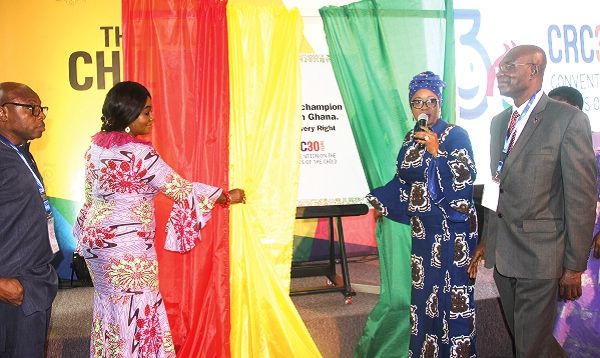
Step up efforts to safeguard children’s rights, UNICEF charges govt
The United Nations Children's Fund (UNICEF) has launched the 30th anniversary celebration of the United Nations Convention on the Rights of the Child (UNCRC) with a call on the government to do more to safeguard the rights of children in the country.
According to the international body, Ghana was the first country to ratify the convention in 1990, and therefore had to step up efforts, like other countries, to ensure that every child enjoyed his/her rights and had fair opportunities in life.
The UNICEF Special Advisor on High Level Events, Initiatives and Partnerships, Mr Nicolas Charles Pron, who made the call, said: “In Ghana today, many issues relating to protection continue to negatively impact on the lives of children.”
He cited horrifying cases of child abuse, mentioning, in particular, high rates of violence against children, child labour and cases of more children living in care homes rather than with their parents.
What is the UNCRC
The UNCRC is a human rights treaty which sets out the civil, political, economic, social, health and cultural rights of children, which according to Mr Pron, was mandated to ensure that the needed swift action was taken to address these concerns.
The promulgation and ratification of the UNCRC provides a uniform set of rights for all of the world’s children and provides opportunities for governments to institute legislation, policies and structures for setting in motion the mechanisms for realising these rights.
Apart from making provisions for enhancing children’s survival, participation and development, the convention also makes provisions for their protection from harm and exploitation.
UNCRC’s relevance
Mr Pron said although the Convention had gotten older, the rights enshrined in the treaty remained as relevant today as it was 30 years ago and encouraged the government to ratify the Optional Protocol to the CRC on the sale of children, child prostitution and child pornography.
This, when done, he said, would send a clear signal to all engaged in the act that the government had zero tolerance for such practices, and that perpetrators would be brought to justice.
Mr Pron said recent data showed a decline in completion rates of primary school for boys and girls, as well as exclusive breastfeeding rates, adding that poor sanitation was also an issue of concern with one in five persons, practising open defecation in the country.
Ghana commended
In a televised message, the UNICEF Executive Director, Ms Henrietta Fore, commended Ghana for its numerous efforts at safeguarding the rights of children but added that “our journey is not yet finished. One out of every five children in this country is stunted, many children don’t have access to clean water and sanitation.
And too many still face the barriers of poverty, discrimination and inequality”.
The Minister of Gender, Children and Social Protection, Mrs Cynthia Morrison, in a keynote address, said the country was making a headway in its quest to protect children.
She said the country, since the ratification of the Convention, had used it to strengthen its laws and had come out with the Domestic Violence Act and the Human Trafficking Act, as well as other child-related policies.
The Chair of the Parliamentary Committee on Gender, Children and Social protection, Dr Kojo Appiah-Kubi, in a message, said members of the committee were working around the clock to ensure that laws protecting the rights of children were adequate and implemented.
He said most worrying was the issue of child marriage, which the committee believed could be eliminated by 2030 and called on all to help make that
The National Coordinator of the Ghana NGO Coalition on the Rights of the Child, Mr Barima Akwasi Amankwa, in a message, said notwithstanding the country’s commitment to the UNCRC, it was still battling with promoting the rights of the child.
He said issues of children were not a priority in municipal and district assemblies; therefore, a lot of social, cultural and other abuses were rampant in communities across the country.
Writer's
